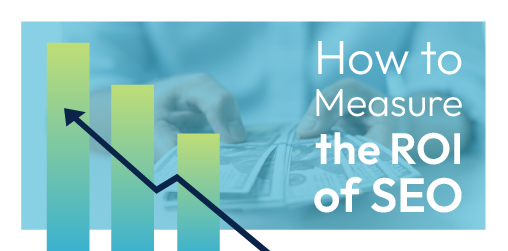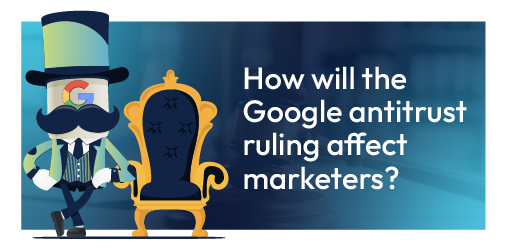How to Measure the ROI of SEO
Search engine optimization (SEO) plays a pivotal role in digital marketing, namely driving organic traffic, increasing brand visibility, and boosting business growth. Measuring the return on investment (ROI) of SEO is essential for understanding how optimization efforts contribute to the growth of your business. Unlike paid advertising, SEO requires consistent effort and time to produce measurable results.

To truly capture the value of SEO, businesses must define clear goals, track key performance indicators (KPIs), and utilize advanced tools to assess performance. Quantifying the financial impact can be challenging, as factors like keyword rankings, traffic, and lead generation all influence outcomes. By focusing on these metrics and tracking results over time, companies can unlock SEO's full potential and ensure their efforts maximize revenue. Given the complexity and evolving nature of SEO, achieving long-term success often requires expert insight and strategic guidance.
Understanding SEO ROI
The value of SEO lies in its ability to drive sustainable, long-term growth for businesses. While many marketing strategies offer immediate but temporary results, SEO delivers lasting benefits by steadily improving a website’s visibility in search engines. As your site climbs the rankings, it attracts highly relevant traffic—users who are already searching for the products or services you provide.
The impact of SEO extends beyond increased traffic. It enhances brand credibility, improves user experience, and cultivates trust among potential customers. All of these factors contribute to better conversion rates and, ultimately, increased revenue. Understanding SEO ROI means recognizing that it’s not just about gaining quick wins, but about investing in a strategy that builds a strong digital foundation, ensuring long-term success as your business grows.
What is the ROI of SEO?
The ROI of SEO refers to the return generated from your investment in optimizing a website for organic search. It evaluates how well SEO efforts convert into measurable business results, like increased website traffic, leads, or sales. Calculating SEO ROI involves comparing the costs of implementing SEO strategies—such as content development, technical updates, and tools—against the revenue or leads generated from organic search traffic. When managed effectively, SEO can deliver substantial, ongoing returns that far outweigh the initial investment.
Why ROI is Important for SEO
Measuring the ROI of SEO is essential because it offers a tangible way to assess how optimization efforts are driving business growth. SEO involves a continued commitment of time and resources, so it's vital to regularly evaluate whether these efforts are delivering valuable results. ROI helps quantify the financial impact of SEO, assuring that the resources allocated are producing a return in the form of traffic, leads, or revenue. Understanding the financial outcomes of SEO gives businesses the ability to make data-driven decisions, refine strategies, and confidently allocate resources to ensure sustained success in their digital marketing efforts.

Sets Business Goals and Investments
Tracking the ROI of SEO allows businesses to align their digital marketing efforts with specific goals, such as increasing revenue, generating leads, or improving brand awareness. By gauging the financial return of SEO, companies can set clear, measurable objectives and make informed decisions about future investments. This insight helps prioritize resources toward strategies that deliver the greatest return, ensuring marketing budgets are used efficiently. Additionally, evaluating SEO performance against these goals enables businesses to adjust their tactics as needed, optimizing both short-term campaigns and long-term growth strategies.
Tracks Digital Marketing Strategy Success
Assessing the ROI of SEO gives businesses a clear picture of how well their digital marketing strategy is performing. Analyzing metrics such as organic traffic growth, lead quality, and overall conversion rates can help companies determine if their SEO initiatives are delivering the desired results. This type of performance tracking enables businesses to identify which tactics are working and which need adjustments. To effectively measure these metrics, tools like Google Analytics, Google Search Console, and SEO-specific platforms such as SEMrush and Moz play a crucial role in providing actionable insights.
Google Analytics
Google Analytics is a powerful tool for tracking SEO success. It provides detailed data on user behavior, traffic sources, and key metrics like bounce rate, session duration, and conversions. Businesses can use it to monitor organic traffic, identify high-engagement pages, and assess keyword performance. This data enables companies to make informed decisions, helps refine SEO strategies, and improves overall digital marketing effectiveness. With customizable reports, Google Analytics gives businesses the capability to focus on the metrics that align with their goals.
Google Search Console
Google Search Console offers key insights into website visibility and search performance, allowing businesses to track keyword rankings, click-through rates, and impressions. It also highlights issues like crawl errors, mobile usability, and indexing problems that impact site performance. By monitoring these metrics, businesses can keep their site accessible and relevant. Additionally, Google Search Console tracks which queries drive traffic, offering valuable insights into how users discover and engage with your site.
SEO-Specific Tools like SEMrush and Moz
Tools like SEMrush and Moz offer advanced resources specifically tailored to SEO performance, making them essential for businesses looking to optimize their search strategies. Unlike general analytics platforms, these tools provide in-depth data on keyword rankings, competitor analysis, backlink profiles, and site audits. With SEMrush and Moz, businesses can track keyword performance, identify new ranking opportunities, and discover areas where competitors are outperforming them. These platforms also help users uncover technical SEO issues that could be affecting search visibility. Leveraging the detailed data and recommendations from SEMrush and Moz helps companies stay competitive and refine their strategies for greater impact.
Defines Profit-Driving Channels

Identifying which channels generate the most profit is critical for refining your digital strategy. SEO ROI helps highlight the most profitable channels, drawing comparisons through organic search, paid campaigns, or social media efforts. Evaluating SEO alongside other digital marketing initiatives allows businesses to allocate resources and prioritize high-performing channels. This approach illuminates where to invest in strategies that drive the most conversions and support ongoing growth.
How to Calculate Your SEO ROI
To calculate your SEO ROI, start by determining the revenue generated from organic traffic. Then, subtract the total cost of your SEO efforts—such as content creation, technical optimizations, and tools used—from that revenue. Finally, divide the result by the total cost and multiply by 100 for a percentage. For accurate results, track how much organic traffic converts into leads or sales using tools like Google Analytics. Keep in mind that SEO is a long-term strategy, so measuring ROI over a longer period, typically six months to a year, will provide a more accurate picture.
The Formula for Calculating SEO ROI
ROI =
Revenue from SEO− Cost of SEO Investment
Cost of SEO Investment
x 100
Examples
To better understand SEO ROI, consider a business that invests $10,000 in SEO efforts over six months. This includes costs for content creation, technical optimization, and SEO tools. Through improved organic search rankings, the business generates $50,000 in revenue from organic traffic during the same period. Using the SEO ROI formula:
400% =
$50,000 − $10,000
$10,000
x 100
This shows a 400% return on investment, proving the effectiveness of their SEO strategy. Monitoring these metrics regularly helps businesses adjust their approach and maximize returns over time.
What is a Good ROI Amount to Expect?
The ideal SEO ROI depends on factors like industry and competition, but many businesses target a 300% to 500% return—meaning they expect $3 to $5 for every dollar invested. Since SEO is a long-term strategy, higher returns typically come after consistent effort over time. Initially, returns might be modest, but as rankings and traffic improve, ROI often increases substantially.
How Long to See ROI Compounded from SEO?
The timeline for seeing compounded ROI from SEO varies, but businesses typically start noticing significant returns after 6 to 12 months. SEO is a gradual process that builds momentum as search rankings improve and organic traffic increases. Progress may seem slow during the early months, but as your site gains authority and visibility, results compound. Sustaining efforts over time allows higher rankings to translate into more traffic and conversions, leading to greater ROI as the strategy continues to evolve.
Comprehensive SEO Strategies to Maximize ROI
To boost the ROI from your SEO efforts, it's essential to take a balanced approach that includes both on-page and off-page optimizations. Regularly refining your keyword strategy, updating content, and addressing technical SEO issues will improve rankings and attract more qualified traffic. Additionally, consistently reviewing performance metrics enables you to adjust your strategy based on what's working and what isn't. By focusing on continuous improvement and making data-driven decisions, businesses can strengthen their SEO performance and achieve a higher ROI over time.

Optimize Long-Tail Keywords
Targeting long-tail keywords is a strategic approach to enhancing SEO ROI. These keywords, while having lower search volumes, often reflect specific user intent, leading to higher-quality traffic and increased conversion potential. When targeting long-tail phrases, businesses can capture niche audiences with less competition, improving their chances of ranking higher in search results. This focus facilitates a more precise alignment with user search queries, ultimately driving more qualified leads and boosting overall SEO performance. Incorporating long-tail keywords into your strategy establishes a more targeted, efficient use of resources.
Enhance User Experience and Site Speed
Optimizing user experience (UX) and site speed is vital for improving SEO ROI. Search engines favor websites that provide fast, seamless experiences, and slow-loading sites often suffer from higher bounce rates and lower engagement, which can negatively affect rankings.
Ensuring a website is mobile-friendly and quick to load keeps visitors engaged, leading to longer session durations and higher conversion rates. A well-structured, easy-to-navigate site enhances the user journey, encouraging return visits and fostering customer loyalty—all factors that contribute to better SEO performance.
Create High-Quality, Relevant Content
Producing exceptional, relevant content is one of the most effective ways to boost SEO performance and drive ROI. Search engines reward content that meets user intent, providing value and answering specific queries. Well-researched, engaging content helps attract organic traffic, extends the time spent on the site, and increases the likelihood of earning backlinks. To maintain relevance, content should address current trends, industry developments, and the evolving needs of your audience. Regularly updating and expanding your content not only keeps it fresh but also signals to search engines that your site is active and authoritative, further enhancing its ranking potential.
Build High-Quality Backlinks

Acquiring high-quality backlinks from authoritative websites is a critical factor in improving SEO performance and driving ROI. Search engines view backlinks as endorsements, signaling that your content is credible and valuable. Securing links from authoritative sources strengthens your site’s domain authority and improves its visibility in search rankings. Effective backlink strategies include producing shareable, insightful content and building relationships with industry leaders and relevant websites. The more relevant and authoritative your backlinks, the greater your chances of ranking higher in search results and driving organic traffic.
Advanced Tips for Boosting SEO ROI
Maximizing SEO ROI often involves implementing more sophisticated strategies to refine and enhance existing efforts. These advanced techniques require a deeper analysis of what’s working, along with more precise adjustments to improve overall performance. From fine-tuning technical aspects to better understanding user behavior, advanced tactics focus on optimizing every element of your SEO plan.
Leverage Buyer Personas for Targeted SEO
Buyer personas help businesses align their SEO strategies with the specific needs of their ideal customers. These detailed profiles represent key segments of your audience, highlighting their goals, challenges, and search behaviors. With this insight, businesses can craft targeted keyword strategies, create relevant content, and optimize their site to attract high-quality traffic. By focusing on the right audience, your SEO efforts become more effective, driving better engagement and higher conversion rates.
Focus on Qualified Traffic
Attracting qualified traffic is imperative for improving SEO ROI. Instead of prioritizing sheer volume, concentrate on bringing in visitors who are more likely to become leads or customers. Focusing on keywords, content, and landing pages that align with the needs of your ideal audience helps drive relevant traffic. This approach leads to better engagement, higher conversion rates, and stronger long-term SEO results.
Make Data-Driven On-Site Adjustments
Performance data offers critical insights into how users engage with your website, guiding strategic on-site changes. Metrics like click-through rates, bounce rates, and time spent on pages help identify areas for improvement, whether it's enhancing navigation, refining content, or optimizing page layout. Using these insights to make adjustments ensures your site is both user-friendly and search-engine-optimized, leading to better rankings, increased engagement, and higher conversion rates.Performance data offers critical insights into how users engage with your website, guiding strategic on-site changes. Metrics like click-through rates, bounce rates, and time spent on pages help identify areas for improvement, whether it's enhancing navigation, refining content, or optimizing page layout. Using these insights to make adjustments ensures your site is both user-friendly and search-engine-optimized, leading to better rankings, increased engagement, and higher conversion rates.
Challenges of Measuring SEO ROI
SEO outcomes evolve gradually, and it can be hard to directly link specific actions to measurable financial results. Various external influences, such as changes in search algorithms and shifts in market dynamics, add complexity to the process. Additionally, translating organic traffic and rankings into clear, quantifiable business results presents another challenge. While increased traffic or higher search rankings are positive indicators, connecting these metrics to tangible outcomes like sales, leads, or revenue often requires deeper analysis and tracking. Understanding the nuances of SEO ROI allows you to set reasonable expectations for the pace and outcomes of your strategy.
SEO Takes Time
The process of achieving SEO results is not instantaneous; it requires time and consistent effort. Search engines need time to crawl, index, and rank your site based on new content, optimizations, and backlinks. Months may pass before any significant changes in organic traffic or search rankings become noticeable. This extended timeline can make it challenging to measure immediate ROI, but the long-term impact of SEO tends to outweigh the initial waiting period. As rankings improve and authority grows, the return on investment steadily increases, delivering sustained benefits over time.

Difficult to Measure Retention Impact
Although SEO is effective in attracting new visitors, its influence on customer retention is harder to track. SEO initiatives like enhancing user experience, boosting site speed, and providing valuable content contribute to customer loyalty, but their direct impact on retention can be difficult to measure. Unlike tracking new leads or sales, the role SEO plays in maintaining customer relationships is less tangible. Factors such as trust, satisfaction, and repeat engagement are shaped by SEO, yet they are not easily reflected in typical ROI metrics. This makes it challenging to attribute retention improvements directly to SEO strategies, even though they play a vital role in overall business success.
Constant Google Algorithm Updates
Frequent changes to Google’s algorithms can make it tough to maintain steady SEO performance. These updates can impact rankings overnight, causing sudden shifts in traffic and search visibility. Even well-optimized sites can be affected if new ranking factors are introduced or existing ones are reprioritized. The unpredictable nature of these changes makes it complicated to predict how SEO efforts will perform over time. Adapting quickly and refining your approach in response to these shifts and maintaining a competitive edge in search rankings requires a proactive strategy.
To keep up with Google's frequent algorithm updates, businesses must continuously refine their SEO strategies. This includes regularly auditing site performance, monitoring backlinks for quality, and refreshing outdated content.
How Does Content Marketing Impact Your SEO ROI?
Effective content marketing significantly influences SEO by improving your website’s visibility and attracting relevant traffic. Quality content that resonates with your audience helps build credibility with search engines, leading to better rankings over time. The connection between content marketing and SEO is vital, as well-crafted content supports search engine optimization efforts by fostering greater user engagement and boosting overall performance.
The effectiveness of content marketing lies in its ability to enhance your SEO strategy, turning visibility into measurable results. As your content drives more organic traffic and engagement, your SEO efforts yield higher returns, maximizing overall ROI.
Crafting High-Quality Content that Converts
For content to drive both traffic and conversions, it needs to be relevant, engaging, and valuable to your target audience. Content that addresses user needs and provides clear answers not only attracts organic visitors but also keeps them on your site longer, increasing the chances of conversion. To be successful, your content should align with user intent, offer actionable insights, and include strong calls to action. This approach turns casual visitors into leads or customers, helping to improve SEO ROI and deliver better business outcomes.
Using Video and Multimedia for SEO
Different forms of media, such as videos and infographics, can significantly enhance user engagement and contribute to stronger SEO results. These elements hold user attention and increase the time spent on your site, which search engines recognize as a positive signal.
Multimedia content also allows you to reach a broader audience by targeting varied search queries. Optimizing videos with relevant titles, descriptions, and tags boosts visibility on platforms like Google and YouTube, driving more natural traffic and improving overall search performance.
The Importance of Regular Content Audits
Conducting routine reviews of your website’s content is crucial for maintaining SEO performance. Over time, content can become outdated, lose relevance, or fall behind current SEO standards. Content audits help identify areas for updates, highlight opportunities for improvement, and remove underperforming pages. Keeping your site fresh reinforces its ability to provide value to others while meeting evolving search requirements.
Boost Your SEO ROI with RivalMind!
Maximizing your return on SEO investment requires expertise, strategy, and ongoing optimization. At RivalMind, we specialize in crafting tailored SEO strategies that deliver measurable results. Our team leverages data-driven insights, cutting-edge tools, and a deep understanding of search engine algorithms to help businesses improve rankings, increase traffic, and convert visitors into customers. Whether you're refining an existing strategy or building a new one from the ground up, RivalMind is here to help you unlock the full potential of SEO and drive sustainable growth for your business.
Ready to elevate your SEO efforts? Reach out to RivalMind today for an audit and discover how we can help you achieve lasting online success.

Meet the Author
Josiah Flex
Senior Search Manager
Josiah Flex, a digital marketer, is passionate about helping companies see real, lasting growth. With a background in personal training, he enjoys helping people identify and achieve their goals – from online visibility to increased leads. Ultimately, consumers use search engines, like Google, to identify the best answer for their needs, and companies engaged in great SEO have the highest likelihood of winning prospective consumers, one step at a time. This is true success.
Specialties: Building Client Relationships, RivalMind Hype Guy
Looking for more organic website traffic?
Welcome to RivalMind. Our purpose is to help your business thrive. We are a digital marketing agency that offers SEO, PPC, Web Design, Social Media and Video Solutions as tools to our clients for online business development and growth.
Contact us today to get started!
Blog Contact Form
Connect with Us:




